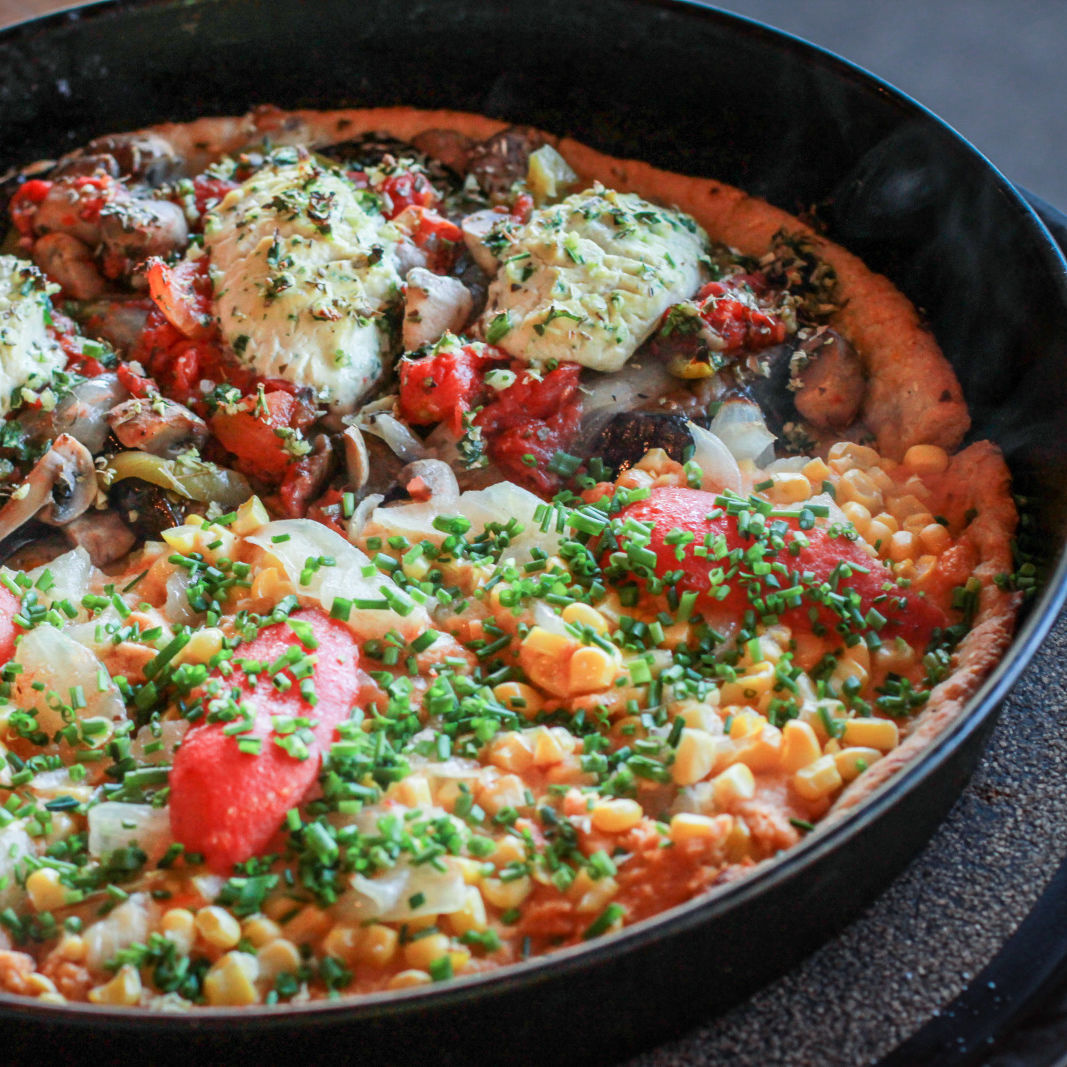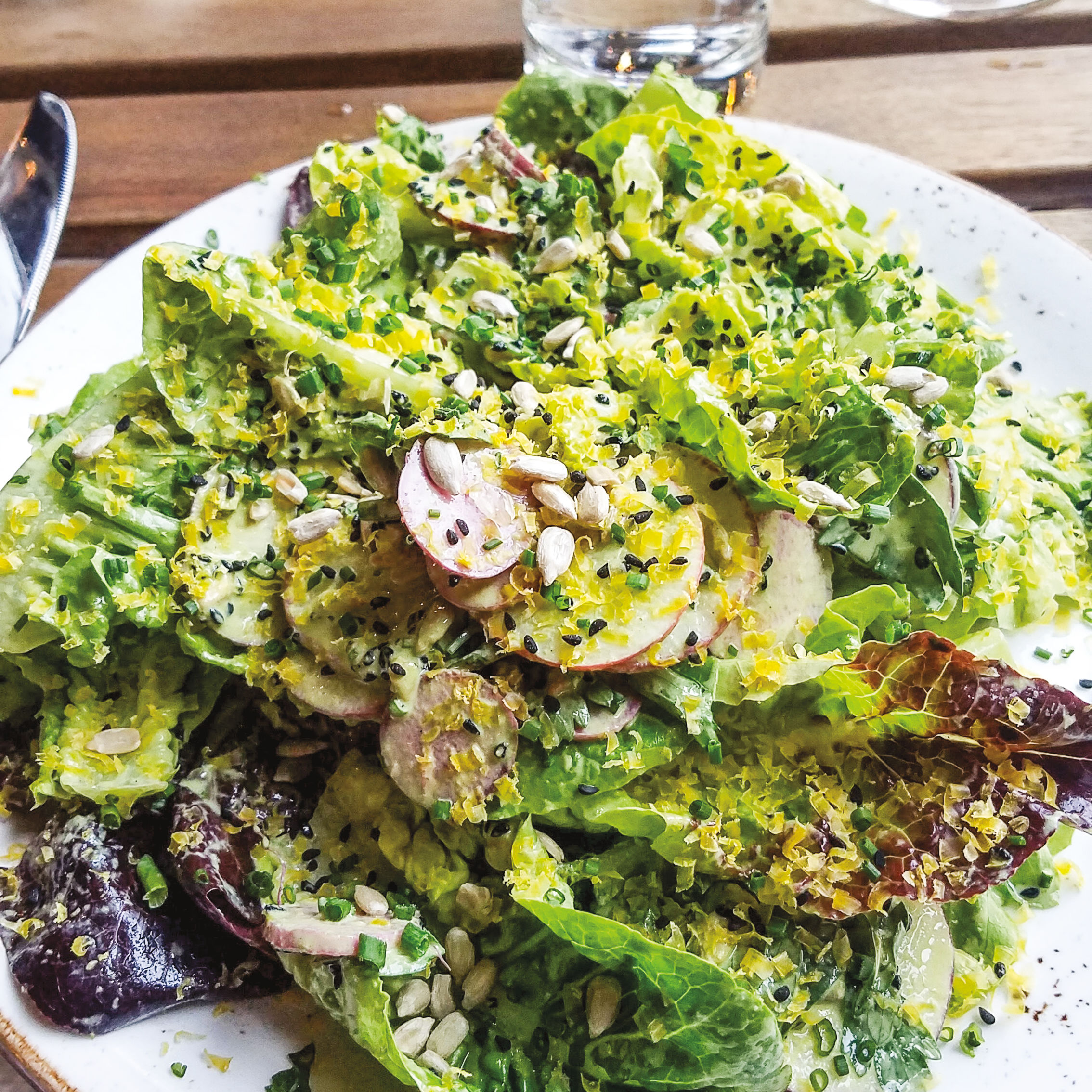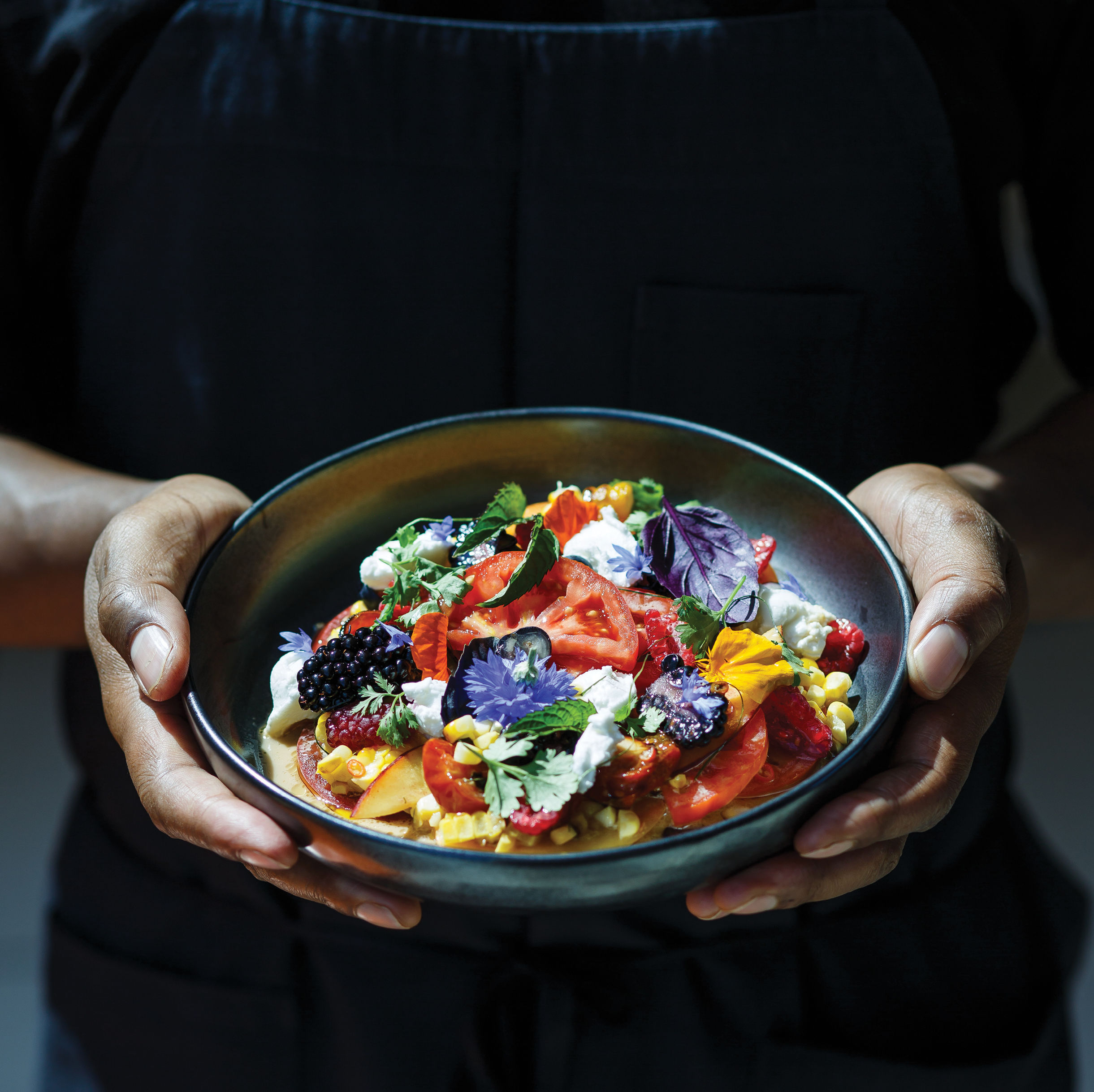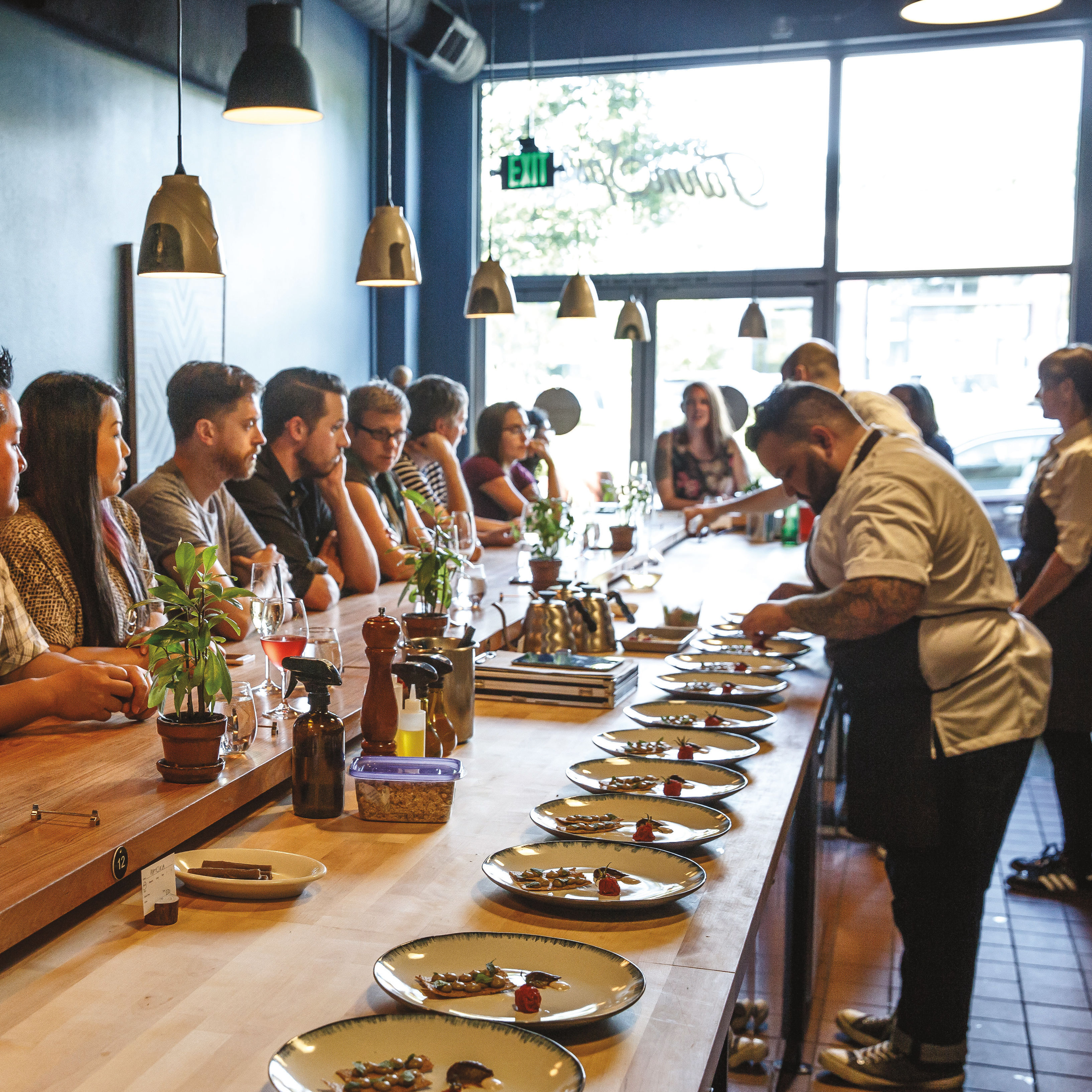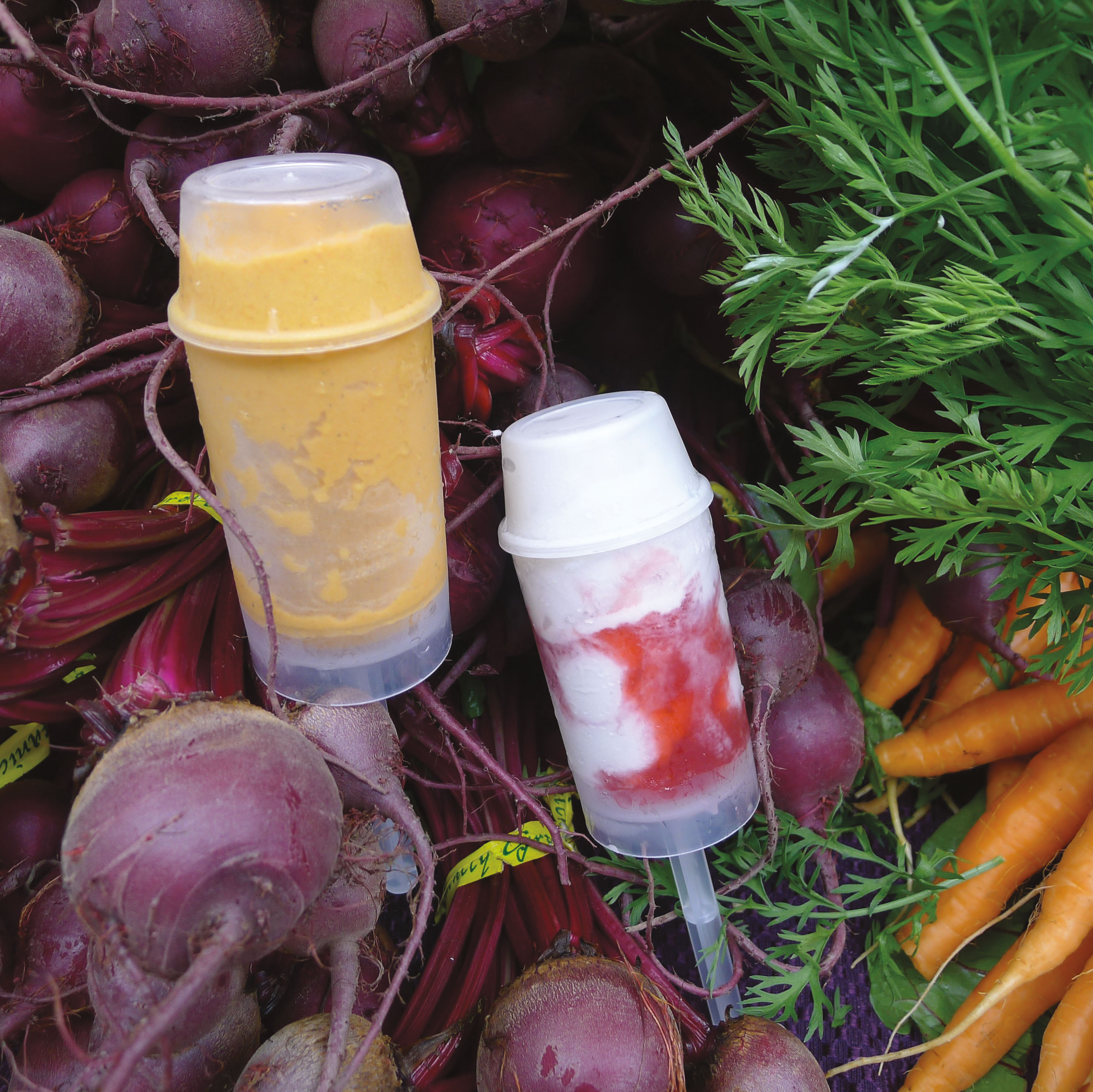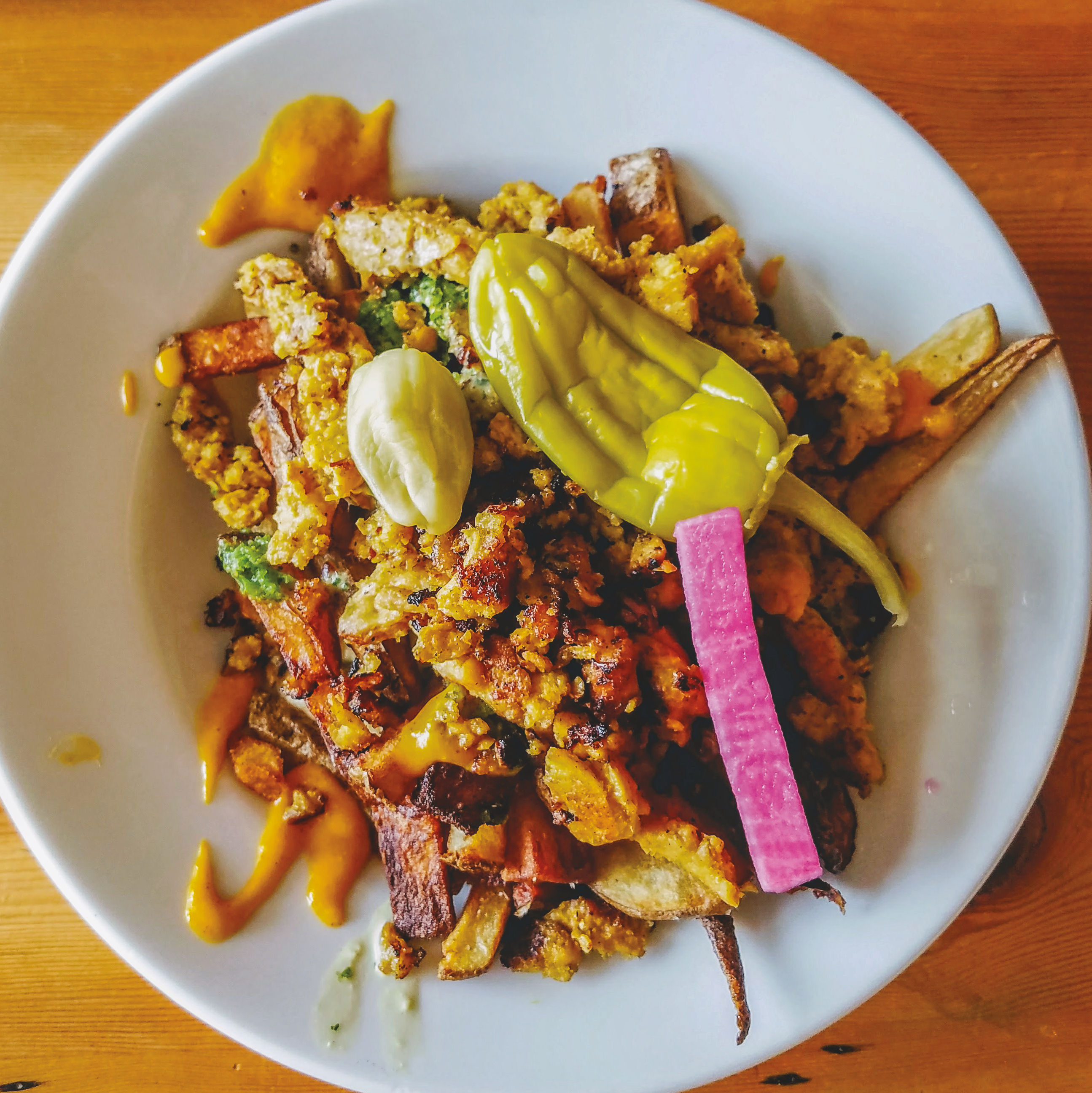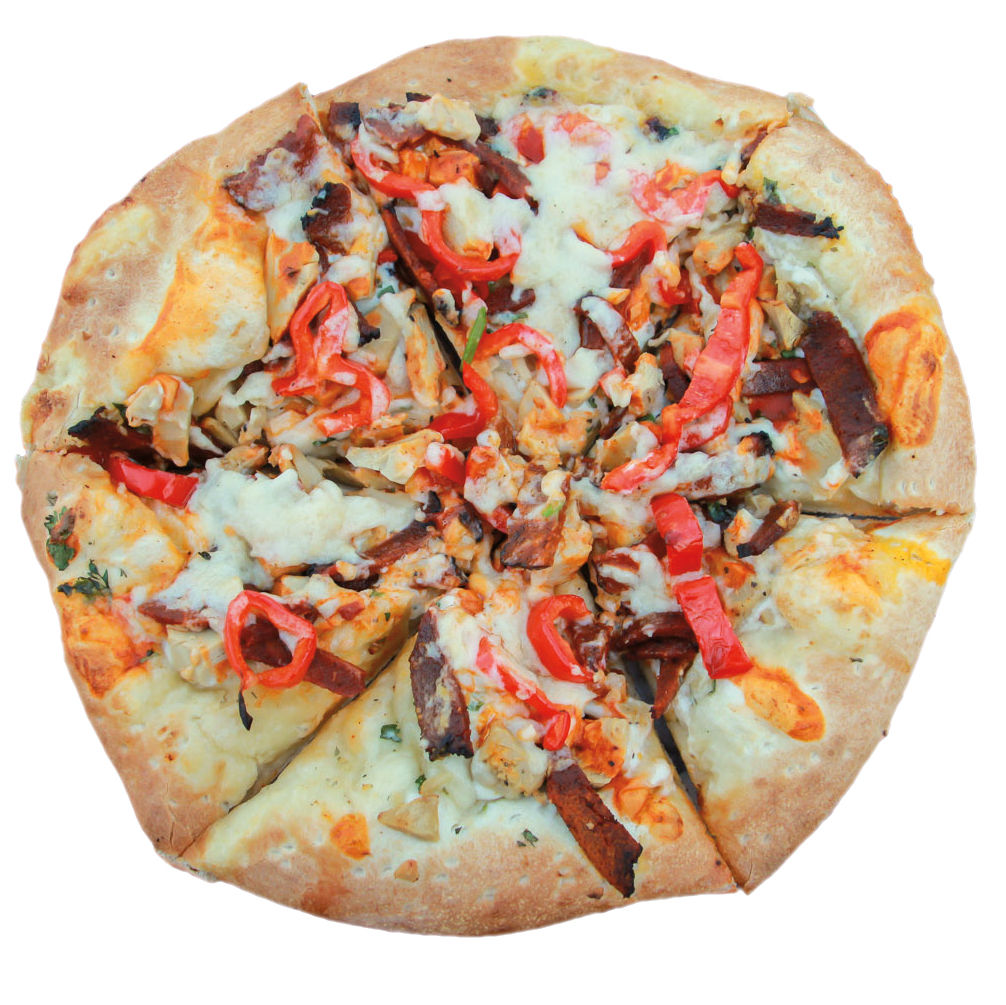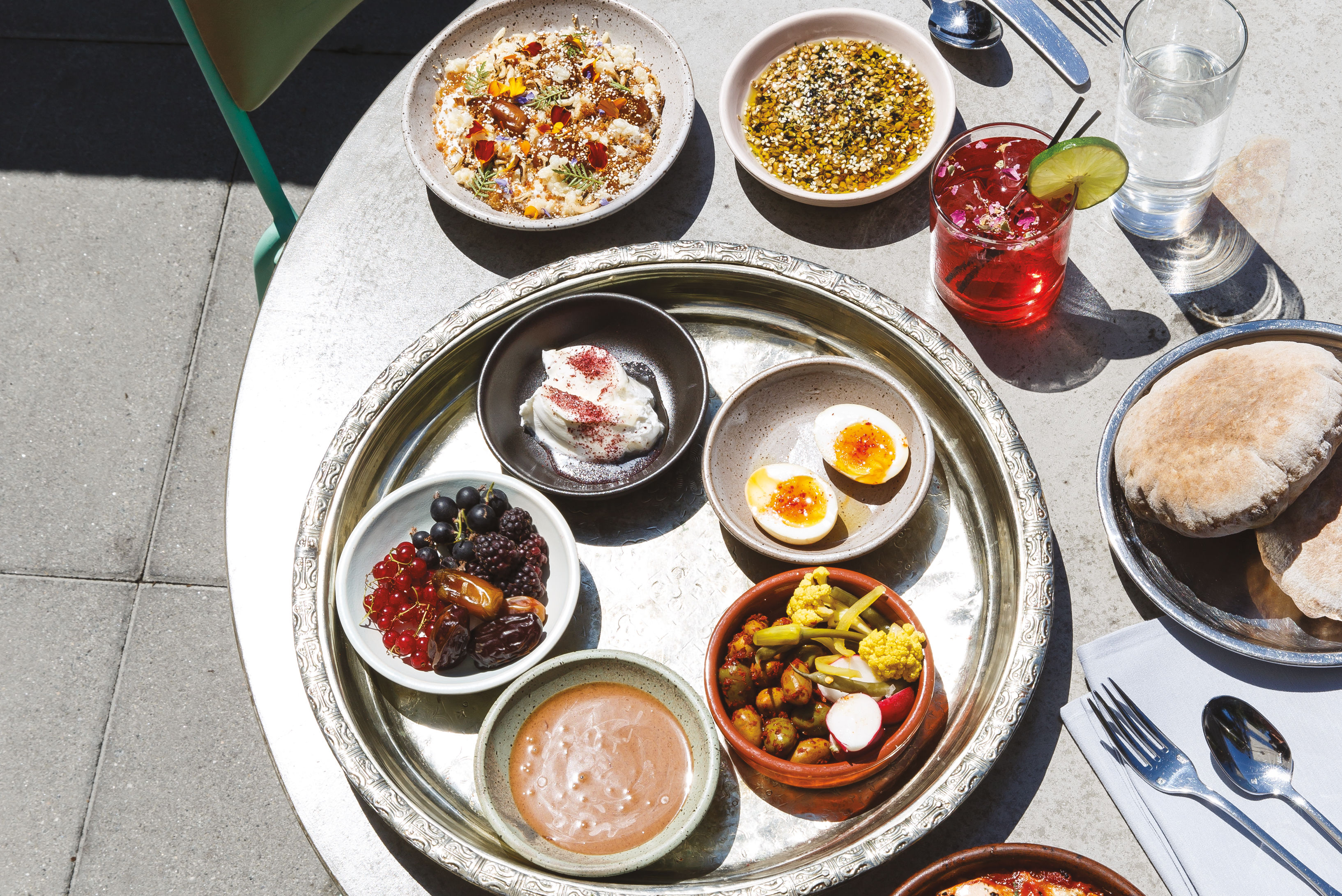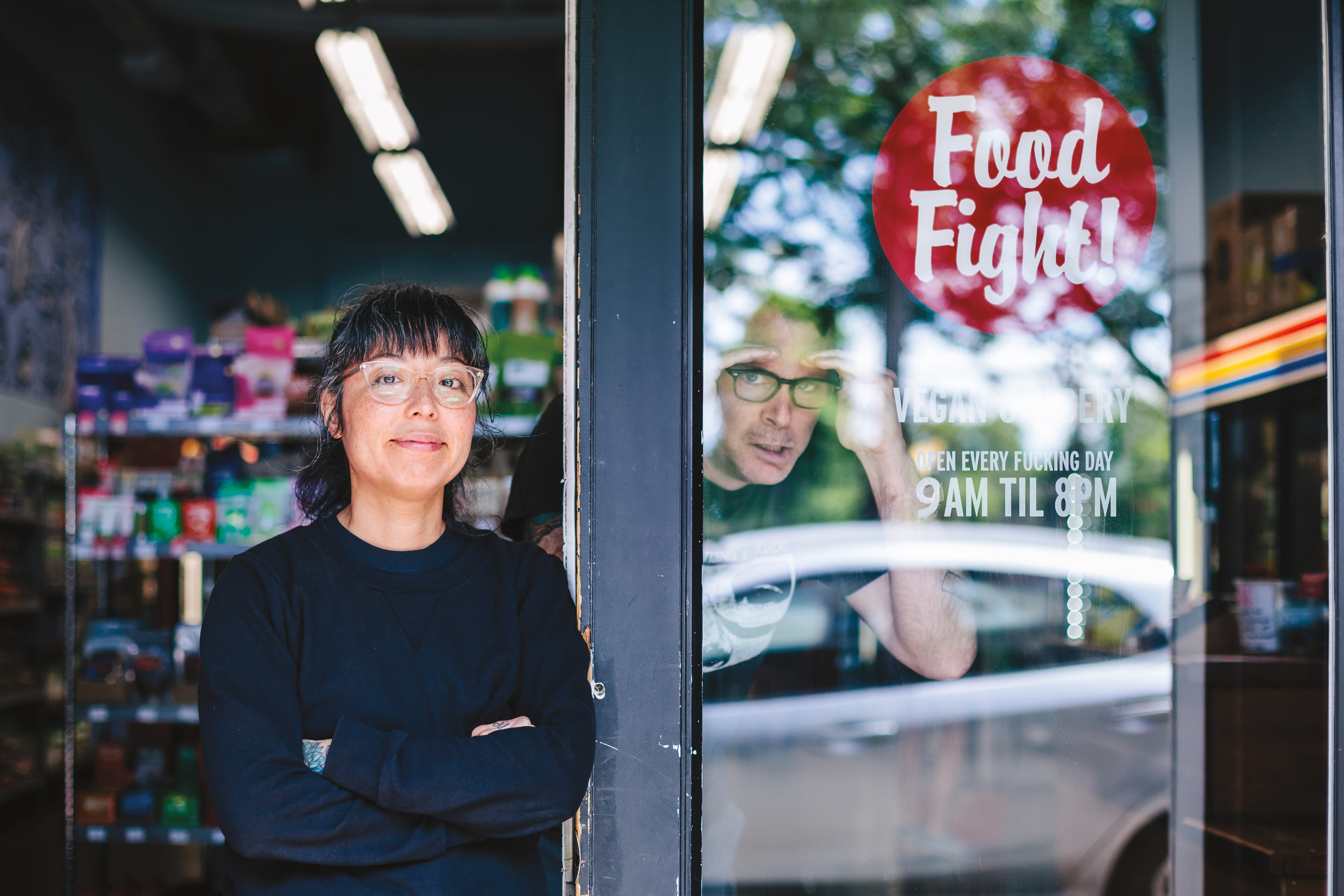
How the Vegans Conquered Portland
Step into Sweetpea Baking Co. You’ll see friends chatting over lattes and cream cheese–smeared bagels. Young couples sharing chocolate croissants. Kids gleefully nibbling on frosted cookies. And, of course, tourists photographing bowls of biscuits and gravy. Two doors down at Food Fight grocery, shoppers stock up on ice cream, handfuls of candy bars, fancy cheeses, and frozen meat-combo pizzas. The scene could easily take place in any American city—except that every single thing, in both shops, is made exclusively out of plants.
“When vegans come to Portland, they’re like little kids at Disneyland,” says Michelle Schwegmann, cofounder of vegan Herbivore Clothing Co, located conveniently between Food Fight and Sweetpea on SE Stark Street. “There are not enough meals in the day.”
Indeed, CNN, PETA, and VegNews magazine have all declared Portland one of the most vegan-friendly places in the country—if not the world—and with good reason. At last count, the city houses nearly 50 all-vegan eateries, not to mention a handful of vegetarian spots and literally hundreds of other restaurants with decent “plant-based” options, to use a trendy term many heath-focused biz owners have adopted. Portlanders can chow down on vegan cronuts, corn dogs, and “chicken” drumsticks complete with sugarcane “bone.” A late-night food cart serves vegan poutine; 10 blocks away, an eight-course plant-based fine dining experience awaits at Farm Spirit. Beyond that, the city’s veggie restaurants are even starting to change how omnivorous chefs cook—and how diners who recoil from the very word “vegan” eat.
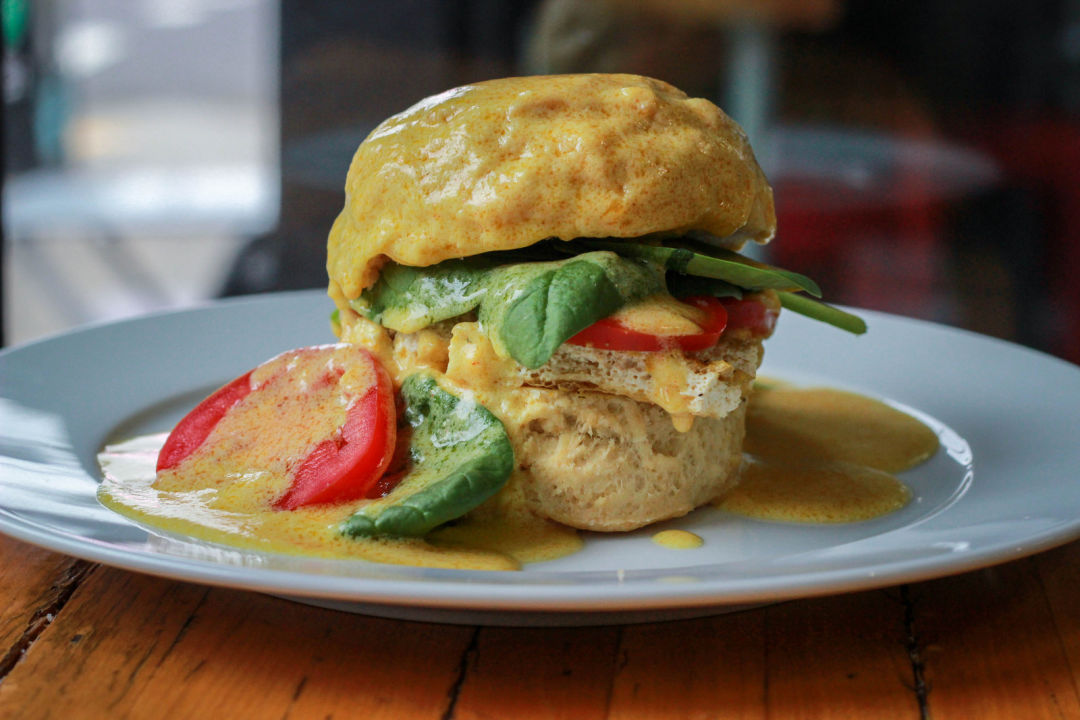
Sweetpea Baking's Wirth-less, a fluffy biscuit topped with fried tofu, tomato, spinach and rich hollandaise sauce
Image: Molly Woodstock
No longer does veganism connote anarcho-punks and hippies eating dry toast in the back of a café. A plant-based diet is now the celebrity lifestyle du jour, and eerily realistic faux meats and nut cheeses now sell alongside quinoa-kale salads and avocado toast. All this prompts the question: How did Portland, a town also known for trumpeting pork belly gluttony, become the capital of vegan decadence?
Easy—it began with punk rock and junk food.
In the Beginning, Food Fight
Our city’s first vegetarian spot, the Seventh Day Adventist–owned Portland Sanitarium Food Company (yum!), opened way back in the 1890s. But modern Portland veganism, steeped in left-wing political activism, hatched almost 15 years ago at Food Fight. When Emiko Badillo and Chad Miller moved from Queens in 2002, Portland was already more vegan-friendly than New York City, thanks to Oregon’s ample fresh produce and vegetarian-leaning cafés (not to mention a history of Animal Liberation Front activity). But the food was still “salad bars” and other “hippie vegan options,” as Badillo puts it.
In 2003, the couple opened Food Fight, a teeny vegan market packed with Tofurky kielbasa, Follow Your Heart cheese, gelatin-free Skittles, faux haggis, and something called “FreeZees Nutcreem Sweedee Pie.” Stuffed into a sub-basement on SE 43rd Avenue and Division Street, the little shop quickly became the unofficial center of a community loosely bonded by diet, politics, and (often) the aesthetics and music of hard-core punk—a sub-subculture that spun off a serious vegan sub-sub-subculture in the ’90s. Food Fight hosted movie nights, farm sanctuary fundraisers, and, in one instance, a cookie contest judged by presidential candidate Dennis Kucinich. Like many scenes, the circle was small but the feelings were fervent.
“Food Fight was the center of the vegan universe for me,” recalls Farm Spirit chef-owner Aaron Adams, who credits Badillo and Miller with encouraging him to go vegan. Herbivore cofounder Josh Hooten agrees, noting that in those days, the community felt small enough to squeeze into one room. “You’d definitely see the same people all the time,” he says. “It was like, if we can all fit in this space, we’ve got to get more people involved [in animal rights].”
More folks did get involved. By 2007, Food Fight and its neighbor, vegan tattoo shop Scapegoat, both outgrew their original storefronts, as had Herbivore, which had been hawking “Praise Seitan” T-shirts out of a small space in Northeast Portland. Together with vegan Sweetpea Baking, the businesses moved into a row of larger storefronts on SE Stark Street at 12th Avenue, across from what is now Revolution Hall. Portland’s own vegan mini-mall was born.
These days, the destination attracts visitors from around the globe—a recent Buzzfeed video titled “Welcome to the World’s First Vegan Mini-Mall” racked up 13 million views in under two months. Food Fight estimates that roughly half of its customers are tourists, while Herbivore guesses closer to 75 percent. “Yesterday,” Hooten said in early June, “I don’t think anyone who came into Herbivore was from Portland.”
Beyond Tofu
Back to Eden Bakery’s Torri Rubi still remembers the first time she went to Blossoming Lotus. “It was the first vegan restaurant experience I had where the food stood on its own,” recalls the chef.
Opened in 2004, the microeatery was tucked into the lobby of Yoga in the Pearl on NW Davis, where both moneyed yogis and punk families dined on healthy comfort grub like zucchini noodle pasta and tacos rolled in Swiss chard leaves—dishes you might not bat an eye at on a menu today, but revolutionary a decade ago.
The biggest draw? Soy-based ice cream. “We would make so much goddamn soft serve,” chuckles former Blossoming Lotus co-owner Tim Hitchins. “People would go nuts for that shit.”
And then, in early 2009, came Portobello, from vegan chef convert Aaron Adams and Dinae Horne, who had worked with Adams at the radical vegan collective Red and Black Café. One of the first plant-based spots to take advantage of local, seasonal ingredients—first as a scrappy pop-up at Cellar Door Coffee and later as a brick-and-mortar on SE Division—the Italian-inspired Portobello demolished expectations of what vegan food could be. The kitchen created tender, tempeh-stuffed agnolotti, truffled mushroom pâtés, and legendary tiramisu. (Much to the chagrin of the local-focused kitchen, the dessert was made with processed Tofutti—but the dish was too popular to change. “I still think about how happy that tiramisu made me sometimes,” says Back to Eden’s Rubi. “It was perfect.”)
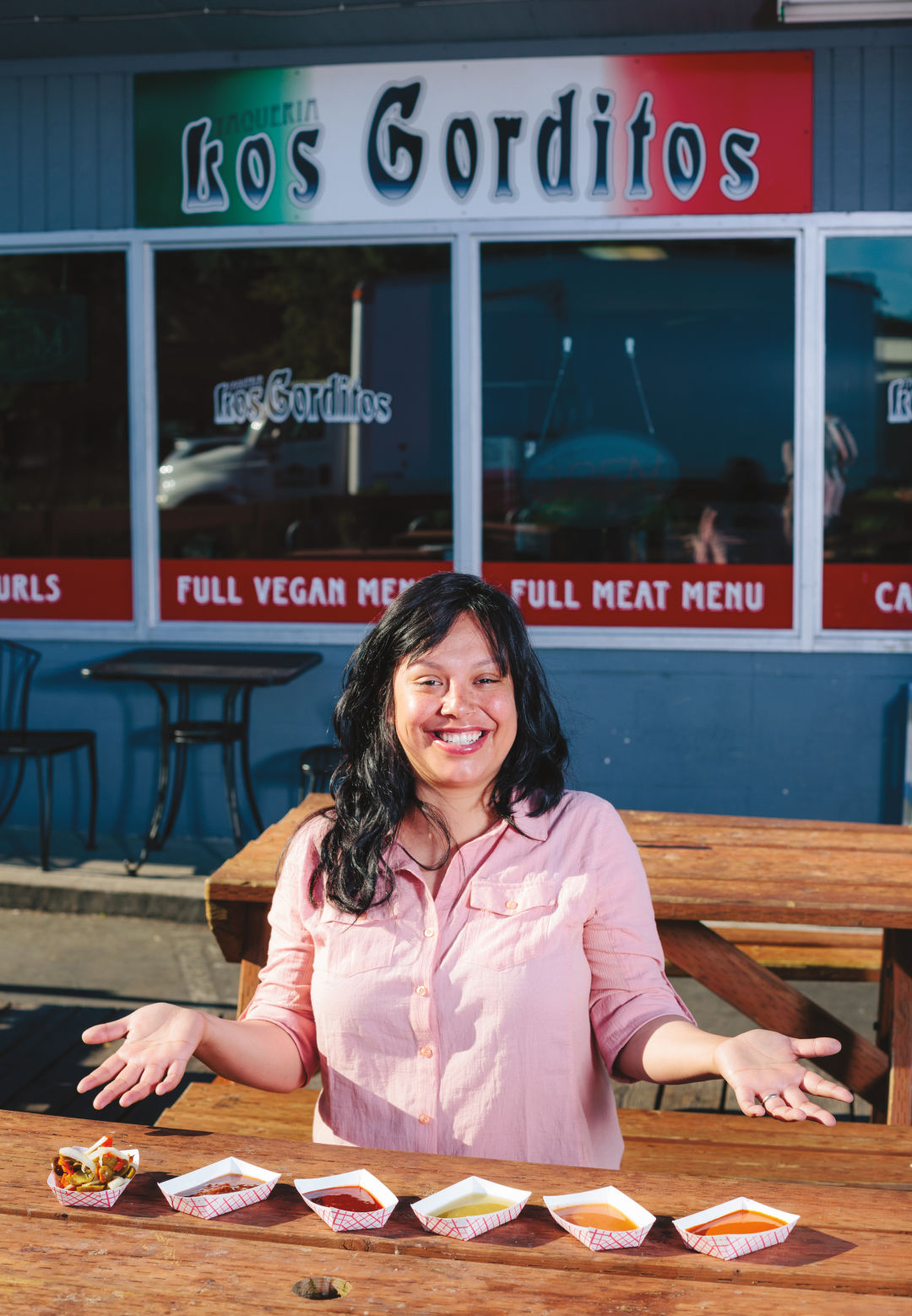
When Alicia Cruz and her family opened Los Gorditos in 2006, they didn’t advertise their vegan options because they “didn’t think it was cool.” Earlier this summer they opened an all-vegan taqueria cart.
Image: Jason Quigley
Around the World in 80 Veggies
In 2006, high school senior and budding vegan Alicia Cruz was given an open-ended assignment to complete a project of her choosing. Other teens might have written a book report; Cruz teamed up with her parents to create a Mexican food truck called Los Gorditos.
With the encouragement of the Food Fight crew, Los Gorditos’ meat-focused truck began offering more options that Cruz could eat: spicy soyrizo tacos, meaty soy curl tortas, and gooey, dairy-free quesadillas. The response was overwhelmingly positive—not just from vegans, but, surprisingly, from carnivorous burrito lovers. Now, the Los Gorditos realm spans six locations across the city, each stocked with dozens of veg options.
Of course, many cuisines have always been more vegan-friendly than standard American fare. A decade ago, restaurants like Ya Hala, Van Hanh, Bete-Lukas, and India Chaat House were often an herbivore’s best bet for a tasty meal. In the past year and a half, Portland has seen a boom of meat-free world cuisine. Crowds dine on vegan pad Thai and dairy-free Thai iced tea at vegetarian KaTi. Vegan Israeli spot Aviv serves up house flatbread smeared with rich, sweet cashew labneh and roasted eggplant salad in the hallowed space once home to Portobello, which closed late last year. We’ve even got our own vegan Chinese takeout joint, Yuan Su, which creates soy- and wheat-based versions of trashy-wonderful gloppy orange chicken and sweet-and-sour pork. (Given the, uh, common conception that veganism is a thing that only white people like, not to mention recent local arguments about authenticity in world cuisine, it’s worth noting that many of these vegan-friendly eateries are owned by immigrants and people of color.)
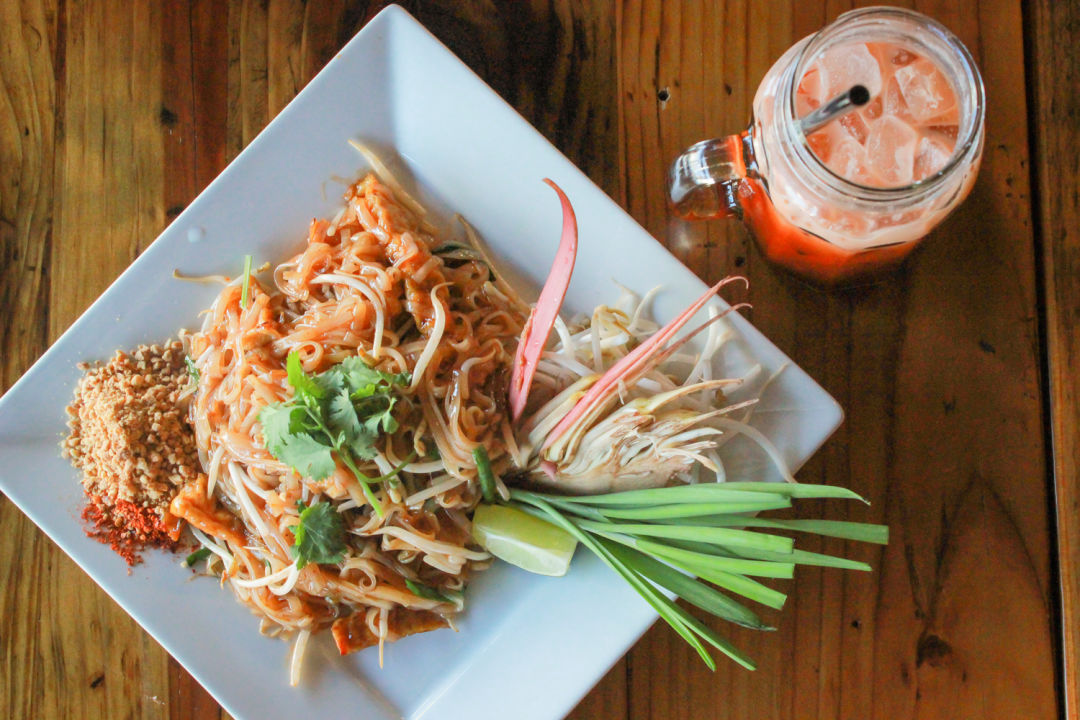
KaTi’s signature pad Thai and Thai iced tea
Image: Molly Woodstock
The Cool Kids
Perhaps no Portland restaurant epitomizes the hip new face of veganism as much as Harlow, a gluten-free and vegetarian café founded by Karen Pride and Britt Galloway in 2013. While not the first of its kind—Canteen and Harlow’s sister eatery Prasad (now in Blossoming Lotus’s original space) blazed the trails—Harlow has arguably become the most popular spot for health-conscious omnivores to dabble in veganism. You won’t find seitan burgers or soft serve here. Instead, the chic SE Hawthorne eatery trots out turmeric lattes, chlorophyll shots, jackfruit wraps, and bowls of steamed greens, all accompanied by the sound of whirring blenders. Lines often snake out the door.
“Portland is a really young city, and I think that’s a lot of it,” says Galloway. “[Many] people who come here are in their 20s and early 30s. Their outlook on food is completely different than someone in their 60s.” Cue the youthful crowds clamoring for green juices and gluten-free chia pudding.
Together with the rise of crowd-pleasing bars like Bye & Bye and Sweet Hereafter, both what you might call “undercover vegan,” and the Tex-Mex-meets-Indian boîte Sudra, spots like Harlow have introduced Portlanders to the concept that some vegan dishes, with their fresh produce and generous spicing, can be as good as, if not superior to, meaty fare, in health and taste.
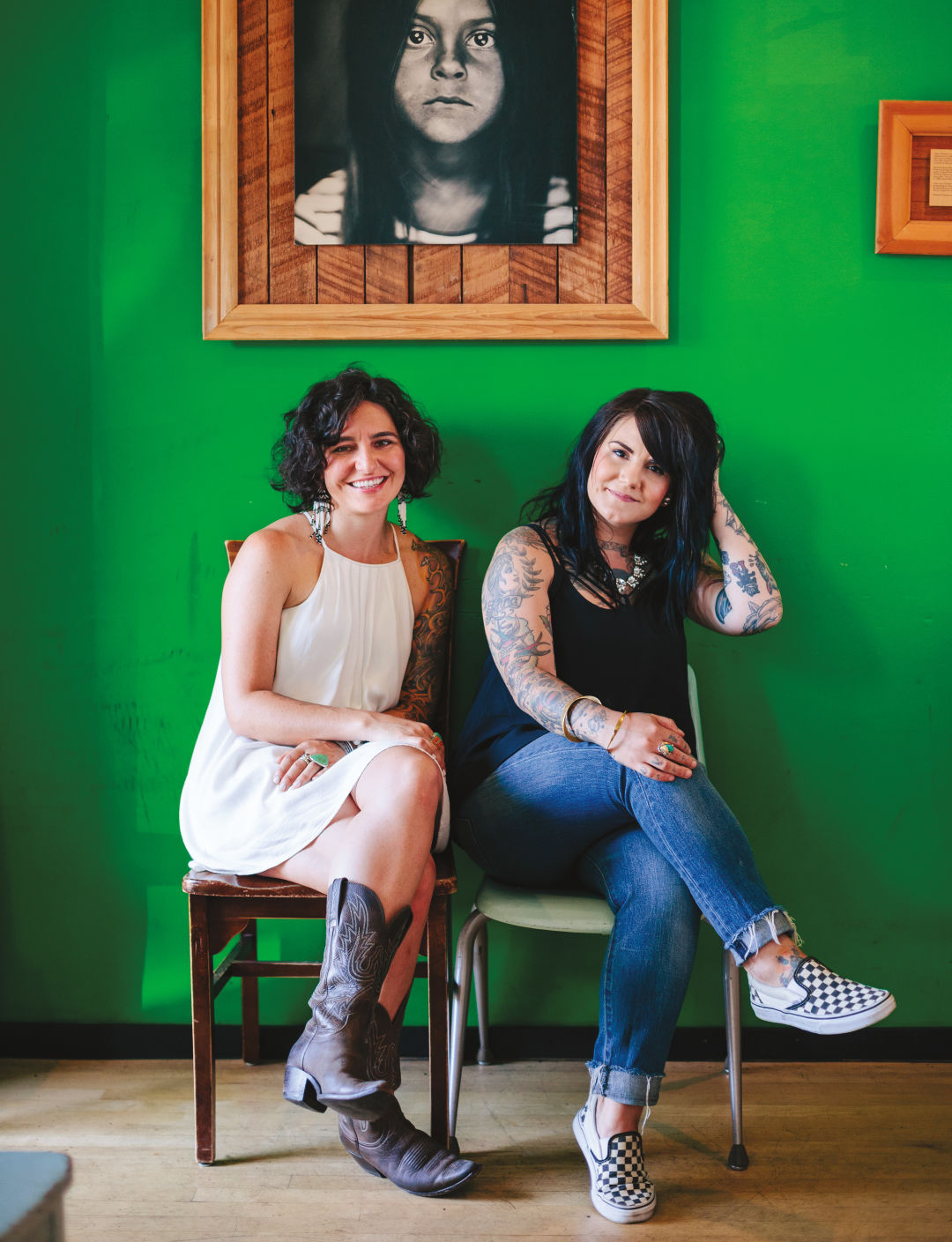
Harlow’s Karen Pride and Britt Galloway. “When we opened up eight years ago with Prasad, people laughed at us,” says Galloway. “[Now] people are taking a page from our book.”
Image: Jason Quigley
Many of the city’s omnivorous farm-to-table restaurants have taken note, adding more salads and veg-forward preparations to their menus. Some, like Ava Gene’s and Castagna, lavish as much care on their celery-date plates and “edible terrariums” as others do steaks and chops. Bon Appétit’s July cover featured a spread of meat-free Mediterranean salads and schmears from trendy Tusk (also responsible for Portland's best new brunch); Top Chef runner-up Gregory Gourdet offers an entire distinct vegan menu at swanky Departure (he also shared a late-summer salad recipe with us).
Outspoken restaurateur and omnivore Micah Camden (Little Big Burger, Boxer Ramen) nails the appeal of Portland’s elevated veggie state when he raves about Harlow’s avocado- and quinoa-heaped bowls: “[Their fare] crosses the line from the typical I-know-it’s-good-for-me-bowl-of-blasé to holy-shit-this-is-fucking-great.”
Punk vs. Plant
As vegan options proliferate across the country and beyond, Portland’s scene is as robust as ever. Wellness gurus extoll a vegan diet for health reasons, and certain environmentalists say we all need to go plant-based to save the planet. For Portland restaurateurs, a vegan option has become as essential on local menus as a house burger. One might assume that vegans everywhere would rejoice, but it’s not so simple.
“The saturation definitely killed the spirit of the community,” says Blossoming Lotus’s Hitchins. Food Fight’s Badillo agrees: “It’s great that veganism is growing, but it’s putting more money into companies that are killing and enslaving animals and people. We’re selling more vegan products, but it’s gotten so far away from any idea of liberation.”
In recent years, nonvegan owners have bought stalwarts like Blossoming Lotus and Sweetpea. And while punk culture and activism inspired local veganism’s formative years—an Earth Liberation Front spokesman founded PDX’s first upscale vegan restaurant (the now-defunct Calendula)—many new vegan eateries rely on terms like “plant-based” to lure more mainstream, apolitical eaters.
“‘Plant-based’ is less polarizing, less divisive,” says Matt de Gruyter, cofounder of Oregon vegan chain Next Level Burger, which serves organic “healthy eating” options like chili cheese fries and a Brownie Explosion coconut milkshake. “If we called Next Level a vegan burger joint, we’d still have people come in who don’t eat a vegan diet, but we’d arguably attract less.”
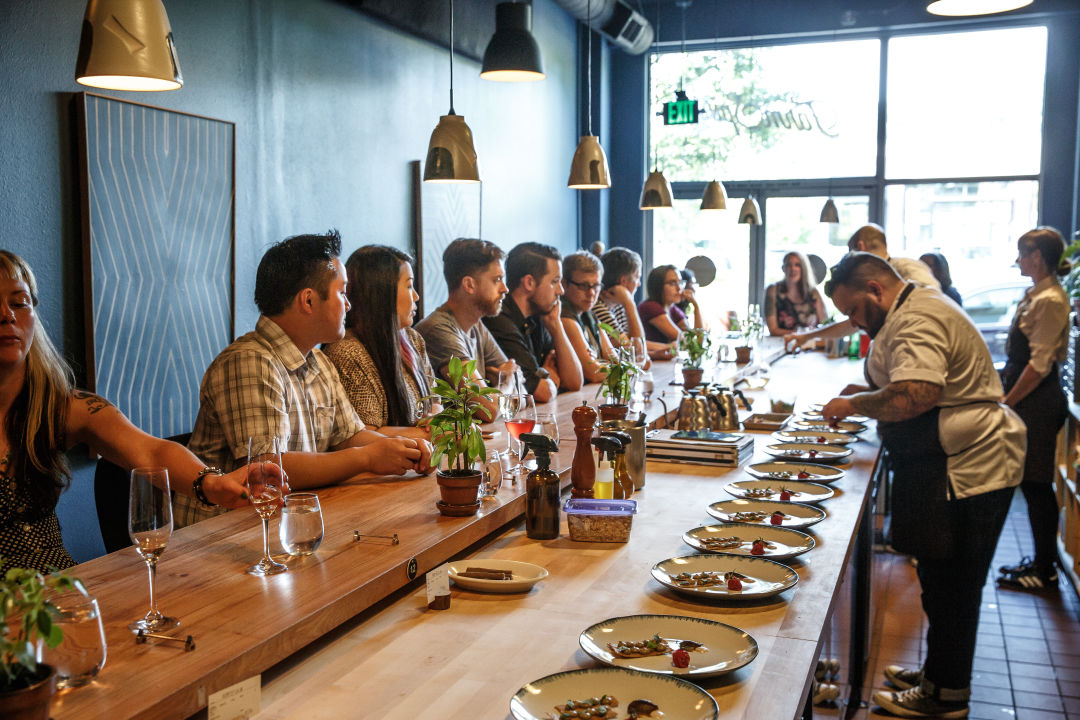
Aaron Adams plates an early course from one of his veggie-loving feasts at Farm Spirit.
Image: Stuart Mullenberg
Portobello alum Adams also reluctantly employs this strategy at his hyperlocal vegan chef’s counter restaurant, Farm Spirit, which was named Oregon’s best farm-to-
table restaurant—meat or no meat—by Travel & Leisure in 2016. “It’s a strategy for us to get recognized, because the sad truth is that people have a real block in their head,” Adams explains. “People are like, ‘When I hear the word vegan, I think of bad food.’”
Other longtime vegans are more celebratory, including Badillo’s neighbors at Herbivore. “I’m sure a lot of people don’t like the mainstreaming of veganism, but all those animals don’t give a shit,” says Hooten. “We have to get people involved. It can’t just be a little club of old ex-punk kids. That’s ridiculous.”
Future Cravings
Like it or not, mainstream veganism is here to stay—better financed, less overtly political, capable of fulfilling any craving. In 2017, Portland gained its first fully vegan doughnut shop (Doe), a veggie diner (Off the Griddle), a vegan coffee shop (Jet Black), and a vegan tiki bar (No Bones Beach Club), plus brick-and-mortar locations for popular carts Homegrown Smoker Vegan BBQ and DC Vegetarian. Five operations launched vegan brunches this summer, including lauded ceviche spot Paiche.
Virtually every longtime vegan biz owner agrees that the tight-knit community of a decade ago—when everyone squeezed into one room for Kucinich and cookies—no longer exists. Internecine squabbles abound. But that could be because the vegan scene now consists of dozens of interwoven communities—families and foodies, enviros and entrepreneurs, punks and powerlifters—spread out in a web across PDX and beyond.
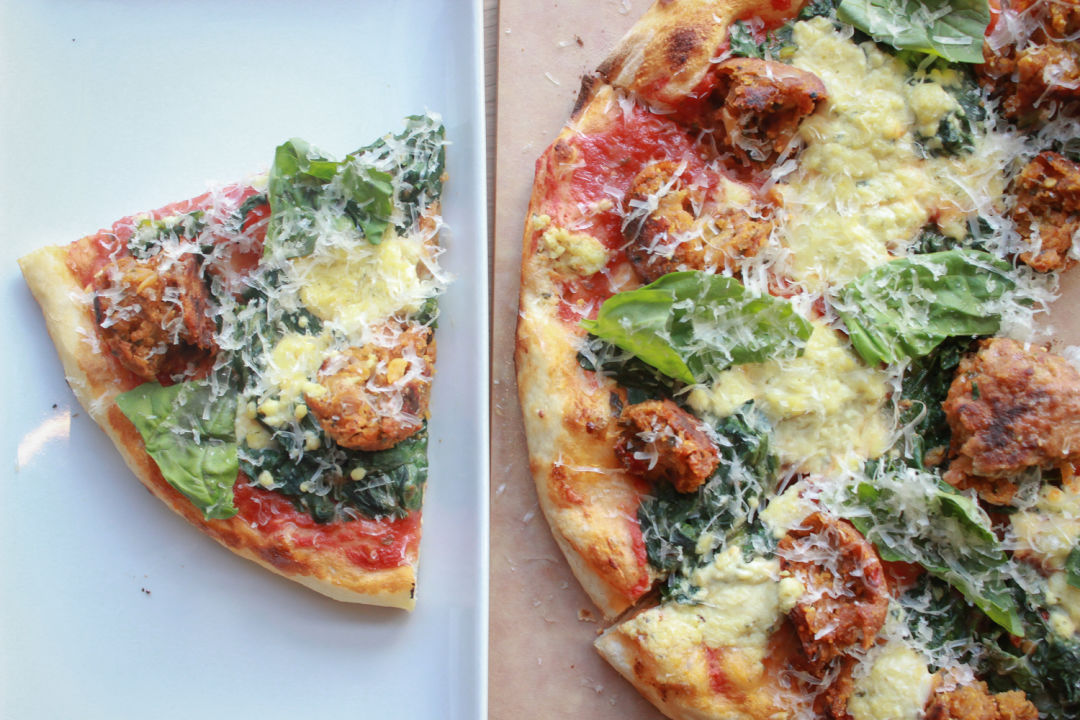
The “Meatball & Chevre” at Virtuous Pie features Baerlic Brewing chorizo meatballs, creamed spinach, lemon herb chevre, basil, and parmesan.
Image: Molly Woodstock
Unsurprisingly, national and international businesses have begun capitalizing on our city’s prospering plant-based economy. For years, German supermarket chain Veganz worked to open a US headquarters in Portland before plans ultimately collapsed. In June, Vancouver, BC–based Virtuous Pie began serving up fancy kimchi jackfruit pizza and charcoal-banana-coconut vegan ice cream across the street from fellow vegan-friendly hot spots Aviv and Los Gorditos, in a restaurant as stylish and modern (exposed beams, succulents, reclaimed wood) as any Bon Appétit–approved joint in Portland.
“Our goal [is] to create food that’s super accessible to everyone, not just vegans,” says Virtuous Pie executive chef Jim Vesal. “We want to compete on that level.”
That’s right, omnivores—the vegans are coming for you. And they’re bringing snacks.
Top Photo: Vegan mini mart Food Fight’s Emiko Badillo and Chad Miller, two pillars of Portland’s modern vegan movement. “Veganism has become so huge that it’s not a subversive act anymore,” says Badillo. (Image: Jason Quigley)
